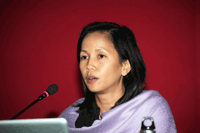Climate: Big Emitters Are Not Willing to Compromise
|
Published on Fri, 2011-04-15 08:17
Source: Xinhua, The Irish Times, Global Post, dpa Developing countries and civil society organisations, such as the Third World Network (TWN), accused the rich nations to avoid a compromise in the most recent UN climate talks, that took place in Bangkok. A group of NGOs condemned on Friday 8 developed countries for selecting in a UN conference in Bangkok some agendas that would benefit only their interests, ignoring what should actually be done to save the planet from climate change. "We are struggling against the agendas that have been already set by the developed countries. If we have a very narrow agenda, we'll have a weak agreement in Durban," said Lim Li Lin from the Third World Network (TWN) in Bangkok. The Seventeenth Conference of the Parties (COP 17) of United Nations Framework Convention on Climate Change will be held in December in Durban, South Africa. Lim said the agenda only reflects interests of the "rich developed countries." "It is really sick to close down the entire Bali Action Plan and instead selectively selected some elements of the Cancun agreement for the discussion this year," Lim said. The Bali Roadmap, including the Bali Action Plan, was adopted by the participating nations to the UN climate change meeting in Bali, Indonesia in 2007. The action plan includes the Working Group on Long-term Cooperative Action under the Convention negotiations, the launch of the adaptation fund, the scope and content of the Kyoto Protocol, as well as decisions on technology transfer and on reducing emissions from deforestation. "Among other things, they want to shut down negotiations to avoid discussing the adequacy and comparability of their efforts," the report says. “We've come to a crossroads now in the negotations, and it is really time for us to agree once and for all in which direction we're going,' said Lin. At that December conference in Bangkok, delegates signed off on a goal to limit warming to no more than 2 degrees Celsius over pre-industrial levels. But even the 2-degree goal will seriously alter the environment for the worse, warned Lin. The U.S. has chosen to “domestically determine what they’re politically prepared to do, not what science has determined,” Lin said. “It will have catastrophic impacts on our planet and humanity.” Developing world delegates in Bangkok warned that, though the U.S. has produced the most planet-warming pollutants, poorer nations will bear the extreme weather, flooded coasts and crop losses brought on by global warming. “It’s insane,” said Bolivia’s U.N. Ambassador Pablo Solon. “We have such a challenge facing climate change and we’re losing time.” Grenada ambassador Dessima Williams, speaking for the Alliance of Small Island States, said they “expect the road to Durban to involve discussion of difficult issues. Nothing should be off the table, nothing should be too sensitive.” She emphasised that “none of us want South Africa to be the burial ground of the Kyoto Protocol”. Japan and Russia reiterated in Bangkok that they would agree to a “second commitment period” under Kyoto, although both countries said they would be willing to consider participating in a wider global deal involving major developing countries, such as China and India. The US position is more negative: not only will it never sign up for a “Kyoto mark 2”, but it doesn’t even see the need for a binding international agreement. Chief EU negotiator Artur Runge-Metzger said Europe could not deal with climate change on its own. “Ideally, we would like a single legal framework, but it looks as if that’s impossible. So we want other countries to do something, whether under Kyoto or some other way.” "We know what scientists tell us to do; we know that we have to at least make an effort to save the planet. Instead, the developed countries just say let's have conversation of what is around the wheel. I'm sorry but that's not good enough," Asad Rehman, from Friends of the Earth said. |
SUSCRIBE TO OUR NEWSLETTER



